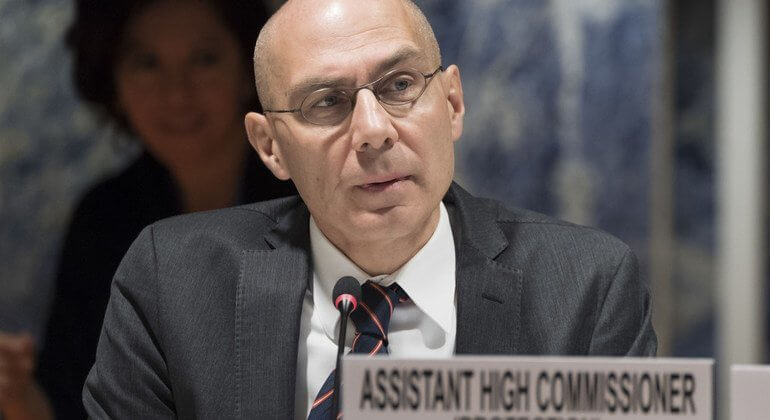The 47-member United Nations Human Rights Council (UNHRC) on Thursday voted during a special session to launch an investigation into Iran’s brutal crackdown on anti-regime protests, with 25 countries, including the United States, the United Kingdom, France, and Germany, voting in favour.
While 16 countries, including India and the United Arab Emirates, abstained from voting, China, Pakistan, Cuba, Venezuela, Eritrea, and Armenia opposed the resolution. The Council will now be able to establish a team of investigators and collect evidence regarding the ongoing violence across Iran.
The special session was convened after members Germany and Iceland submitted an official request on Thursday.
🔴 BREAKING
— UN Human Rights Council (@UN_HRC) November 24, 2022
At its 35th special session, the @UN Human Rights Council decided to create a new fact-finding mission to investigate "alleged #HumanRightsViolations in the Islamic Republic of #Iran related to the protests that began on 16 September 2022."#SS35 pic.twitter.com/d1wqPCC7fy
Before the vote, UN human rights chief Volker Türk urged the Islamic Republic to “acknowledge the deep-seated social, economic and political grievances that have been building up” and “accept the legitimacy of those calling for different visions of society.”
“We have seen waves of protests over the past years, calling for justice, equality, dignity and respect for human rights. They have been met with violence and repression,” Türk said.
“The unnecessary and disproportionate use of force must come to an end. The old methods and the fortress mentality of those who wield power simply don’t work,” he went on to say.
Calling the situation in Iran a “full-fledged human rights crisis,” Türk accused Iran’s security forces of “using lethal force” against unarmed protesters in “blatant disregard of international rules on the use of force.”
“The security forces, notably the Islamic Revolutionary Guard Corps and Basij forces have used live ammunition, birdshot and other metal pellets, teargas and batons,” he noted.
Also Read: How Likely is the Iranian Regime to Survive Ongoing Protests?
According to conservative estimates over 300 protesters have been killed and around 14,000 people, including children, have been arrested. Children are being arrested at schools, hundreds of university students are threatened daily, and security forces are arresting civil society actors from their homes and workplaces, said Türk.
He also chastised the regime for denying detained protesters access to lawyers and physically and psychologically torturing them as well as harassing the families of protesters and labelling demonstrators and their friends and families as agents of foreign states.
In this respect, the human rights chief stressed that only an investigation can hold those responsible for committing crimes accountable, calling for “independent, impartial and transparent investigative processes into alleged violations of human rights.”
Iconic moment today in U.N.'s emergency Iran debate:
— UN Watch (@UNWatch) November 24, 2022
🫳🎤 #MahsaAmini #IranRevoIution https://t.co/1Nhi1Tgl52
Iran, however, called the result of the vote “disgraceful and appalling,” saying the UN should focus more on the human rights situation in Palestine and the plight of the indigenous community in Canada. Tehran’s representative to the Council, Khadijeh Karimi, said Western countries “lack the moral credibility to preach others on human rights and to request a special session on Iran.”
United States Secretary of State Antony Blinken, meanwhile, said the UNHRC plays a “crucial role to play in drawing international attention” to the violence in Iran.
“Today’s session leaves no doubt that the HRC’s membership recognizes the gravity of the situation in Iran, and the fact-finding mission established today will help ensure that those engaged in the ongoing violent suppression of Iranian people are identified and their actions documented,” he asserted.
Brave girls of Esfahan are leading the anti-regime protests. Long live Iranian women and long live the new revolution. #IranRevoIution #MahsaAmini pic.twitter.com/VbtCHa58Ia
— Masih Alinejad 🏳️ (@AlinejadMasih) November 24, 2022
Anti-regime protests erupted across Iran in mid-September in the wake of the death of 22-year-old Kurdish woman Mahsa Amini, who was arrested by Iran’s notorious morality police for not wearing her hijab correctly. Amini was brutally tortured and beaten and died while receiving treatment at an intensive care unit of the Kasra hospital in Tehran.
What initially began as protests demanding an end to mandatory hijab laws have gradually morphed into a nationwide movement calling for the end of the theocracy in Iran. Protests have spread rapidly across the nation and galvanised school and university students, including girls, labour unions, and prisoners.
Nationwide demonstrations have continued to spread for more than 70 days. According to Iran Human Rights (IHR), at least 416 protesters, including 51 children and 27 women, have been killed in clashes with security forces. The IHR noted that protesters have been killed in all 25 provinces where demonstrations have occurred. The greatest number of deaths have taken place in the Sistan, Baluchistan, and Kurdistan provinces.

